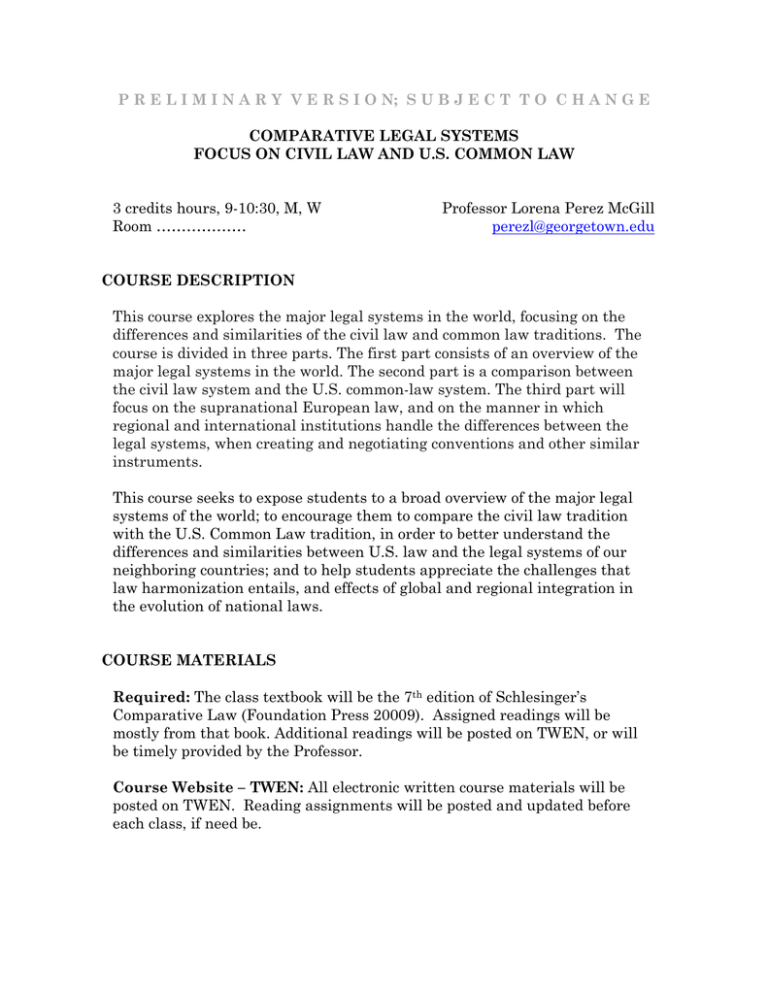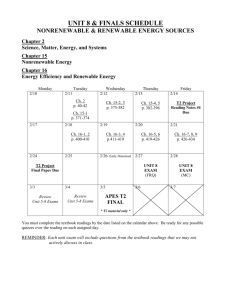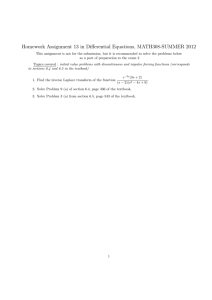Document 10884446
advertisement

P R E L I M I N A R Y V E R S I O N; S U B J E C T T O C H A N G E COMPARATIVE LEGAL SYSTEMS FOCUS ON CIVIL LAW AND U.S. COMMON LAW 3 credits hours, 9-10:30, M, W Room ……………… Professor Lorena Perez McGill perezl@georgetown.edu COURSE DESCRIPTION This course explores the major legal systems in the world, focusing on the differences and similarities of the civil law and common law traditions. The course is divided in three parts. The first part consists of an overview of the major legal systems in the world. The second part is a comparison between the civil law system and the U.S. common-law system. The third part will focus on the supranational European law, and on the manner in which regional and international institutions handle the differences between the legal systems, when creating and negotiating conventions and other similar instruments. This course seeks to expose students to a broad overview of the major legal systems of the world; to encourage them to compare the civil law tradition with the U.S. Common Law tradition, in order to better understand the differences and similarities between U.S. law and the legal systems of our neighboring countries; and to help students appreciate the challenges that law harmonization entails, and effects of global and regional integration in the evolution of national laws. COURSE MATERIALS Required: The class textbook will be the 7th edition of Schlesinger’s Comparative Law (Foundation Press 20009). Assigned readings will be mostly from that book. Additional readings will be posted on TWEN, or will be timely provided by the Professor. Course Website – TWEN: All electronic written course materials will be posted on TWEN. Reading assignments will be posted and updated before each class, if need be. Comparative Legal Systems – Focus on Civil Law and U.S. Common Law Lorena Perez McGill 2 Handouts: Exercises and additional materials will be handed out in class. When possible, additional materials will also be posted on TWEN. All handouts will become part of your course materials. EXAM The examination will be a 3-hour, open-book exam that will consist of hypothetical and essay-type questions covering the course materials. READING ASSIGNMENTS Reading assignments are given as part of the course outline, below. Assignments will average 35 to 50 pages per class, depending on the topic. Additional materials will be timely added to TWEN and/or handed out in class when considered relevant. Additional materials are, for the most part, cases and articles relevant to the class, and newsclippings, audioclips or videoclips on current developments pertinent to the class. Some additional materials will be the focus of our in-class role-playing exercises and debates. Students are expected to review them. The professor will provide students with hypotheticals and problems for the in-class exercises and debates. CLASS PARTICIPATION Students are expected to attend class. Classroom participation is strongly encouraged during the discussions, debates and role-playing exercises that will take place in class. Most exercises will be oral while some may be written; some exercises will be individual, while most will be in teams. All students must be prepared to participate in class and to be called upon. For role-playing exercises, the Professor will assign roles to each student prior to class. Students’ active participation in class discussions and positive contributions to class debates and exercises will be taken into account in the final course grade, but only to their benefit. CONTACTING THE PROFESSOR The Professor may be reached at perezl@georgetown.edu. She will be available to meet on campus on the days the class meets, between 11 and As of 11-­‐Jan-­‐16 Comparative Legal Systems – Focus on Civil Law and U.S. Common Law Lorena Perez McGill 3 noon. For appointments, contact the Professor by email or by phone/text at 202-294-4473. CLASSES AND READING ASSIGNMENTS FIRST PART: BROAD UNDERSTANDING OF MAJOR LEGAL SYSTEMS. FIRST CLASS: Laying the foundation. Readings: Textbook, pp. 2 (Comparative Law and Globalization Process); 7-13 (Comparative Law and Neighboring Disciplines: Theory and Practice; section (a); and Professor Reimann’s article); and 15-31 (The World Development Report 2002, Chapter on the Judicial System). CLASS 2: Classification of the Legal Systems – Is that Possible? Readings: Textbook, pp. 258-70 (The Comparative Lawyer as a Zoologist: The Problem of Classifying Legal Systems; and Notes (1) through (10)). Class 3: Civil law in General – Germany and other European countries. Readings: Textbook, pp. 384-404 (Codification of the Law; The Meaning of Codification in the Civil Law Tradition); and 477-81 (The National Codifications: The Codes’ Break with the Past (including Gutteridge’s article). Suggested reading: Joseph Dainow, “The Civil Law and the Common Law: Some Points of Comparison”, The American Journal of Comparative Law, Vol. 15, No. 3 (1966-1967), pp. 419-35. Class 4: Common law in General – British/ US common law. Readings: Textbook, pp. 489-554 (The Modern Organizatin of Justice: The Institutional Setting of Case Law); and 136-41 (Non-State Law in the United States, or Culture as Law (and Professor Walter’s article, Autonomous Law Making: The Case of the Gypsies). Suggested reading: Textbook, pp. 594-96 (Roscoe Pound: The Spirit of the Common Law, and Notes & Questions). CLASS 5: Shari‘a Law, Muslim Law, Islamic Law. Readings: Textbook, 362-83 (Islamic Law; Early Foundation of Islamic Law; Nature and Sources of the Shari‘a). Suggested reading: Mohammad Hashim Kamali, SHARI‘AH LAW: AN INTRODUCTION, Chapter 13, Reflections on Some Challenging Issues, pp. 262297. Class 6: The law of India. As of 11-­‐Jan-­‐16 Comparative Legal Systems – Focus on Civil Law and U.S. Common Law Lorena Perez McGill 4 Readings: David and Brierley, MAJOR LEGAL SYSTEMS IN THE WORLD TODAY (2d Ed., 1978), Title II, Chapter II, National Law of India, pp. 462-76; Textbook, p. 362-63 (Early Foundations of Islamic Law); Brief History of Law in India, The Bar Council of India, online at http://www.barcouncilofindia.org/about/about-the-legal-profession/legaleducation-in-the-united-kingdom/. CLASS 7: The law of China. Readings: Textbook, pp. 31-36 (WTO and Legal Reforms: The Case of China; Donald C. Clarke’s article); 42-47 (Legal Orientalism: Rites or Rights? Note on the “Ritual of Rights”); 291-310 (Trying to Understand the Current Chinese Legal System; Introduction to the Legal System of the People Republic of China); and 131-36 ((Mis)Identifying Culture: Asian Women and the “Cultural Defense”). Class 8: The Law of Russia. Conclusion on the review of major legal systems. Readings: Textbook, pp. 214-19 (Justice in the U.S.S.R.: An Interpretation of Soviet Law; Notes on Ideological Precepts as Formants of Private Law in Central-East European Countries). Textbook, pp. 190-213 (The Comparative Lawyer as a Geographer: Tentative Area-by-Area Survey). PART TWO: COMPARING THE CIVIL LAW TRADITION WITH U.S. COMMON LAW. Class 9: How are judicial opinions written in the U.S., in countries following the Civil Law tradition? Interpretation, Analogy, and Related Matters in the Civil Law Tradition: how different is it from the doctrine of precedent? (Part 1 of 2) Readings: Textbook, pp. 554-82 (please also read the cases Jand’heur v. Les Galeries Belfortaises, Textbook pp. 460-61, and Desmares, pp. 462-66). Suggested reading: Re-read Joseph Dainow’s article (see class 3). Class 10: Interpretation, Analogy, and Related Matters in the Civil Law Tradition: how different is it from the doctrine of precedent? (Part 2 of 2) Readings: Textbook, pp. 582-93; 596-626 (cases Dorothy Herbert Ardoin et al. v. Hartford Accident and Indemnity Co. et al., 360 So.2d 1331 (1978); Opinion of the German Federal Constitutional Court in the Proceeding Concerning the Constitutional Complaint of Publishing Company “Die Welt” and Mr. K.-H.V., BverfGE 34, 269 (1973); and Opinion of the German Federal Constitutional Court Concerning the Constitutional Complaints of Two Trustees in Bankruptcy, BverGE 65, 182 (1984); also, notes at the end of each case, and Concluding Observations on Stare Decisis). As of 11-­‐Jan-­‐16 Comparative Legal Systems – Focus on Civil Law and U.S. Common Law Lorena Perez McGill 5 Class 11: The Obligation to Right a Wrong – Tort Law. Readings: Textbook, pp. 455-76 (An Example of the Adaptation of a CodeBased System to Technological and Economic Change: Tort Law and the Shift from Fault to Strict Liability (including the cases Jand’heur v. Les Galeries Belfortaises, Textbook pp. 460-61, and Desmares, pp. 462-66 – re-read)). Class 12: Lawyer’s Compensation. Readings: Textbook, pp. 684-706 (Lawyer’s Compensation. Beginning of a Fictional Dialogue Concerning a Not-Too-Fictional Case). Class 13: Differences and commonalities regarding procedure: Approach, and Recent Developments. Readings: Textbook, pp. 707-15 (Procedure; Introduction; Recent Developments); and [an article, to be provided by the Professor]. Classes 14 & 15: Differences and commonalities regarding procedure: Civil Lawsuits – personal jurisdiction, service of process, parallel proceedings. Readings: Textbook, pp. 715-46 (The Course of a Civil Lawsuit; Personal Jurisdiction (Territorial Competence); Michigan Statutes on Personal Jurisdiction; French Code’s articles on Territorial Jurisdiction; case Fondation Solomon R. Guggenheim v. Consorts Helion-Rumney; Service of Process; Parallel Proceedings (Lis Pendens)). Classes 16 & 17: Differences and commonalities regarding procedure: pleadings, evidence, discovery, witnesses, and expert witnesses – hearings and evidence. Readings: Textbook, pp. 746-809 (Pleadings and Formation of Issues; Evidence and Discovery; Party and Witness Statements; The “Trial” (Evidentiary Hearings); Expert Evidence). Class 18: Differences and commonalities regarding procedure: judicial review, amparo, habeas corpus, injunctions. Readings: Textbook, pp. 523-30 (re-read); [Brewer-Carias, CONSTITUTIONAL PROTECTION OF HUMAN RIGHTS IN LATIN AMERICA: A COMPARATIVE STUDY OF AMPARO PROCEEDINGS (Cambridge Univ. Press, 2009, pp. 73-79), to be provided by the Professor]. Class 19: Differences and commonalities regarding criminal procedures. Readings: Textbook, pp. 828-55 (sec. 4. Criminal Procedure). Class 20: What is orden público? Public policy doctrine in the civil law tradition. Reading: David and Brierley, pp. 137-39 (113); [additional reading (IBA publication) to be provided by the Professor]. As of 11-­‐Jan-­‐16 Comparative Legal Systems – Focus on Civil Law and U.S. Common Law Lorena Perez McGill 6 PART THREE: SUPRANATIONAL LAW; TRANSNATIONAL LAW; HARMONIZATION OF THE LAW. Class 21: Globalization – its impact on legal systems and traditions. Readings: Textbook, pp. 31-36 (re-read); 70-73 (Global Legal Integration); and 864-72 (Duncan Kennedy, Two Globalizations of Law and Legal Theory). Classes 22 & 23: Regional integration – EU, MERCOSUR, CARICOM, ASEAN, Arab League, COMESA and others. Readings: Textbook, pp. 73-95 (Regional Integration; European Union Law; cases Flaminio Costa v. E.N.E.L., van Gend & Loos, Amministrazione delle Finanze dello Stato v. Simmenthal SpA, Andrea Francovich and Daniela Bonifaci and others v. Italian Republic, and Criminal Proceedings against Maria Pupino; South America, including Samuel Arieti’s article; and all notes & questions); [articles on CARICOM and ASEAN to be provided by the Professor]. Class 24: International law, supranational law: what’s the difference, and why? Sovereignty and ratification of international conventions: who has the power? Reading: [To be provided by the Professor]. Class 25: Homogeneity, uniformity, one size fits all? Readings: Textbook, pp. 126-31 (Thomas Kelley’s article excerpt, including case of Niger); 248-58 (Legal Pluralism; Jessica Fourneret, France: Banning Legal Pluralism by Passing a Law); [the Professor will provide transcript of Judith Freedberg’s presentation during the ABA/IABA 2009 academic event, Law Unification in The Americas, Status and Prospects: “The New York Convention: Is Enforcement Always its Goal?”] Class 26: Lost in Translation – difficulties with language and terminology. Readings: Textbook, pp. 154-64 (Fritz Moses, International Legal Practice; Graziadei, Mattei and Smith, A Short Note on Terminology; Kieninger and Gretton, Glossary; Problems of Communication and Language Interpretation). Class 27: Wrap up and review. No reading assignments. COURSE GOALS The goals of this course are threefold. First, to expose students to broad characteristics of the most widely known law systems, in order for them to better understand the relationship between law systems and culture. Second, As of 11-­‐Jan-­‐16 Comparative Legal Systems – Focus on Civil Law and U.S. Common Law Lorena Perez McGill 7 to allow students to understand the features and peculiarities of the civil law system, when compared with the U.S. common law. And third, to discuss the challenges international and regional institutions confront when dealing with their members and their different legal backgrounds. By the end of this course, students should have achieved these three goals, while having an enjoyable and challenging learning experience in class. As of 11-­‐Jan-­‐16


